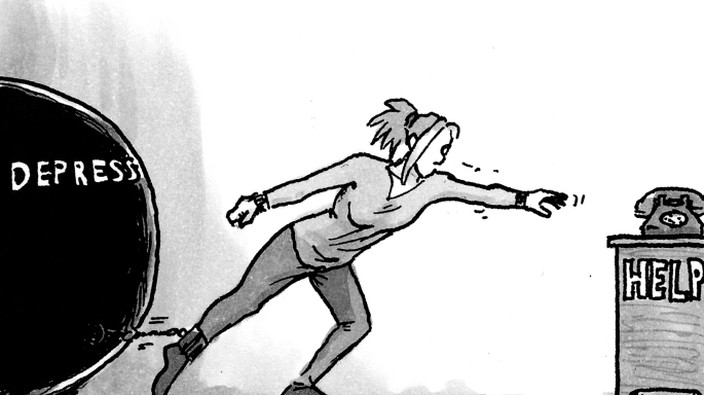clay jonathan is a canadian high school teacher by day, and comic artist by night. he writes and draws depression comix, “a graphical representation of how depression and other related illnesses feel from a personal perspective.” the collection, which was selected for preservation by the library of congress, became popular in the early days of social media and struck a chord in the very online portion of the mental health community who found themselves and their struggles with depression acutely represented through the incredible power of art. this is his story. like a lot of people, i was living with depression but i didn’t know i was. i just thought of it as part of who i was and didn’t think it was anything special that needed to be treated. when i participated in some psychology experiments in university, it was then i realized that there was indeed something wrong. i was given advice to get in touch with counselling for feelings of anxiety, dread and discomfort. i did that, but i still didn’t fully understand the depth of the problem. because i had been living with it for so long, it had messed up my perception of the world so i couldn’t really understand it was
me that was having the problem – not the world i was seeing through the lens of depression.it was a bit of a struggle and a wait to get to a psychiatrist to get an official diagnosis and start medication. but when i did, i found that my first appointment involved very little talking, plus a prescription for prozac. i didn’t know how these pills could help me; back then, there wasn’t exactly a robust internet to get answers from. however, i did feel ashamed for taking them and didn’t tell anybody except my mother. when i did tell her, she flipped out and told me that the prozac would make me kill everyone in their sleep. so because of that, i ended the prescription and getting help. i feared it would make people trust me less.some time later, i moved to japan, hoping that a change of environment would help. but i was still nagged by sleeping problems and decided to see a doctor. their (very quick) diagnosis was that i was homesick and should just go back home to canada. i knew that wasn’t the issue, but it dissuaded me from getting help here, in japan.about three years ago, i knew i needed to make a change so i decided to try again. this time i found a doctor who didn’t ask many questions and just gave me the medication. that was the biggest milestone. it made my depression feel like a real medical problem instead of “being selfish” or being “a whiner,” many of the stereotypes of depressed people that were common and still are. my medication helped me sleep at night and made my life easier to live. i had also cultivated a number of friends who understood, so it felt like i didn’t need to keep it hidden anymore. it’s a lot easier to deal with if you have support that is not judgmental. i didn’t have a support system for a long time, though. because of my experiences at the beginning and the shame i felt, i didn’t seek it out. that said, i think one of the biggest pieces of support one can get is just reassurance that it
is a problem and not some personality defect. thankfully, i have since been able to cultivate that support, but it has been a quarter century struggle to get there.one way i found to express my feelings was through my art. i always loved drawing comics from when i was barely old enough to write. i like the comic’s ability to tell a story and i think it’s less work to digest than, say, the written word by itself. i don’t really find it cathartic, but when i’m in the “zone” drawing, i think of nothing other than drawing. i become focused and nothing else matters but the area where the pen hits the paper. all other pains and things i don’t really want to think about fall in the background and i can let myself be consumed in the moment. i also play guitar and find that comforting as well. all art is performance and when you’re concentrating on that, nothing else exists. mind you, the depression doesn’t disappear and sometimes it prevents you from getting into that mode, but when you
do get into it, nothing else matters.so, in 1997, i started a mainly biographical comic. but it wasn’t doing anything for me because i felt i had to “justify” my depression. like i had to have a good origin story for it, one that would satisfy any critic looking to dismiss the illness. then, two years later, i started an adult humour comic, but depression made it difficult to continue. it sputtered and every time i tried to get it going again i couldn’t. a lot of bad stuff happened around that comic, but i loved drawing and tried to find a way to keep it going.
 7 minute read
7 minute read




![rah04076-edit[1]](https://smartcdn.gprod.postmedia.digital/healthing/wp-content/uploads/2021/10/rah04076-edit1-scaled-e1635562215755.jpg)





